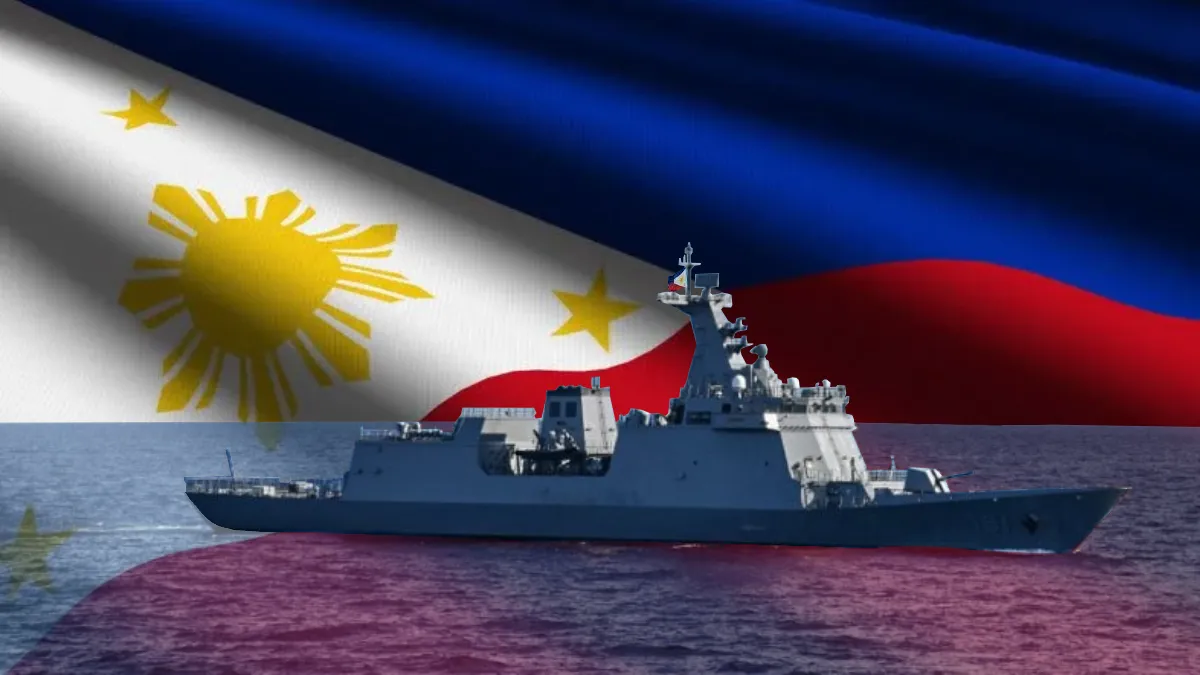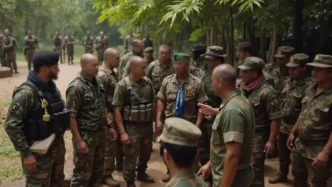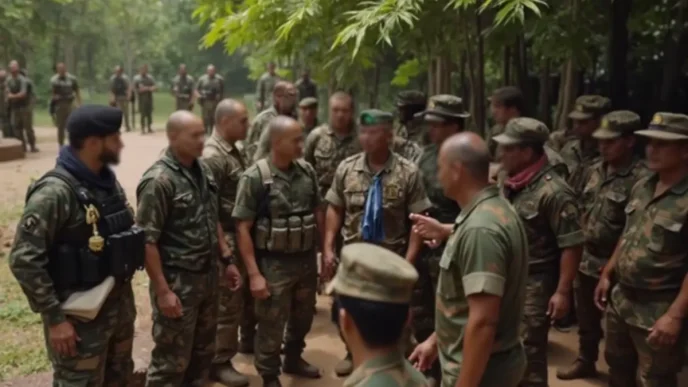A Filipino documentary capturing the struggles of fishermen and military personnel in the disputed South China Sea has ignited a diplomatic firestorm, with China accused of attempting to suppress its screenings. Directed by acclaimed filmmaker Baby Ruth Villarama, the film sheds light on a contentious maritime dispute, raising questions about freedom of expression and geopolitical influence in the region.
A Film Caught in Geopolitical Crossfire
In the heart of Manila, a documentary titled Food Delivery: Fresh From The West Philippine Sea was poised to make its debut at the PureGold CinePanalo Film Festival in March 2025. Directed by Baby Ruth Villarama and produced by Voyage Studios, the film offers an intimate look at Filipino troops delivering supplies to remote outposts and fishermen navigating harassment from Chinese vessels in the Spratly Islands—a region claimed by multiple countries, including the Philippines, China, Vietnam, Malaysia, Brunei, and Taiwan. The title itself is a nod to the term Filipinos use for the portion of the South China Sea within their 200-nautical-mile Exclusive Economic Zone (EEZ), a designation fiercely contested by Beijing.
However, the film’s premiere was abruptly canceled, with festival organizers citing external factors. While no official explanation was provided, Villarama and her team suspect political pressure from China was the driving force behind the decision. “It was clear these efforts were not about artistic dialogue” Villarama told regional media. “They were about control. The Chinese government has long used economic pressure to influence institutions into pushing a single narrative.”
Despite this setback, the documentary found an international stage at the Doc Edge Festival in New Zealand on June 30, 2025, where it received positive reviews and won the Tides of Change award for highlighting global issues such as conflict and human rights. Yet even this screening was not without controversy. The Chinese Consulate-General in Auckland issued a formal protest, labeling the film as rife with disinformation and false propaganda in a letter later shared online. The consulate urged organizers to cancel the screening, warning it could mislead the public and strain China-New Zealand relations. Doc Edge stood firm, emphasizing its commitment to independence and curatorial freedom. Additional screenings in Wellington and Christchurch were scheduled for later in July.
Humanizing a Complex Dispute
At its core, Food Delivery seeks to humanize a dispute often reduced to geopolitical jargon or legal arguments over maritime boundaries. Through the lens of Filipino soldiers and fishermen, the documentary captures the daily realities of life in a contested zone. Villarama describes the film as transcending the specifics of the West Philippine Sea, focusing instead on universal themes. “It is about so much more than the West Philippine Sea. It is about how food, a basic human need, becomes a language for connection, resistance, and care” she said. “And in that way, it becomes something every audience can understand—Filipino, Chinese, or anyone who has ever craved meaning in the middle of chaos.”
The film’s narrative strikes a chord in a country where visual storytelling holds significant cultural weight. As Dr. Aries Arugay, a visiting senior fellow at the ISEAS – Yusof Ishak Institute in Singapore and chairman of the Political Science Department at the University of the Philippines, noted, “A documentary is potent from a Filipino cultural perspective because we are visual as a people. It will penetrate the public consciousness more, so it is threatening to them [China].”
Yet, despite its global recognition, the documentary struggles to find a foothold in its home country. Major cinema chains in the Philippines, which typically prioritize blockbuster films over documentaries, have not agreed to screen it. This reluctance comes amid simmering tensions between Manila and Beijing over the South China Sea. Independent filmmakers like Villarama often turn to alternative avenues such as film festivals, university circuits, and grassroots community screenings. Her team has embraced this model, scheduling a Philippine premiere on July 27, 2025, at a popular shopping mall in Manila, with additional community screenings planned for August and beyond in collaboration with advocacy groups and film collectives.
China’s Alleged Interference and Broader Implications
The attempts to block Food Delivery have drawn sharp criticism from academics and observers who see China’s actions as an overreach into the Philippines’ cultural and political spheres. Associate Professor Danilo Arao, a journalism lecturer at the University of the Philippines, described China’s efforts as both media suppression and diplomatic overreach. “It is not just an issue of media freedom, it is also an issue of overreach on the part of China because they are trying their best to deodorize their image and to control the narrative pertaining to what they claim to be control over the South China Sea, including the West Philippine Sea. So, it is deplorable that they are doing that” he said.
Dr. Arugay echoed these sentiments, labeling China’s actions as “undue intrusion into the internal affairs of another country.” This ultimately amounts to foreign interference, at the cultural level. He argued that Beijing increasingly leverages seemingly benign sectors—such as trade, art, and cultural exchange—as tools of influence. “There are no benign aspects of relationship with China because they can weaponize and use it against the country” he stated. Even if the documentary does not overtly criticize China, its very existence challenges Beijing’s tightly controlled narrative on the maritime dispute.
These concerns are not new. In April 2025, then-Senator Francis Tolentino accused the Chinese Embassy in Manila of orchestrating a hidden and sinister disinformation campaign to sway public opinion and discredit critics of Beijing’s South China Sea claims. China denied the allegations and subsequently banned Tolentino from entering the mainland and its territories. Such incidents underscore the broader tensions at play, where cultural products like films become battlegrounds for geopolitical narratives.
Freedom of Expression Under Pressure
For Villarama, the backlash from China has only reinforced the urgency of her film’s message. “The attempts to block the film didn’t intimidate us. They clarified our purpose” she said. She views Food Delivery as more than a documentary about a maritime dispute; it is a call to action for Filipinos to assert their identity and resilience. “Food Delivery isn’t just about delivering food. It is delivering a message: that Filipinos have had enough. Enough of being pushed aside, erased, or told who we are. It is a call to remember who we are, and who we must never become” she added.
Some Philippine officials have reportedly reached out to Villarama’s team following reports of China’s intervention in New Zealand, though she remains cautious about expecting uniform government support. “We are not expecting uniform support from them, especially when geopolitics are involved. But I do hope this film encourages our leaders to defend freedom of expression, and to stand with the people whose lives and labor make that freedom necessary” she said. Dr. Arao also called for the Philippine government to take a more proactive stance in protecting artists and journalists from foreign political pressure.
A Wider Battle for Narrative Control
The controversy surrounding Food Delivery highlights a larger struggle over narrative control in the South China Sea dispute, where cultural and media expressions are increasingly weaponized. For China, maintaining a singular narrative on its maritime claims is paramount, often leading to efforts to suppress dissenting voices—whether through economic pressure, diplomatic protests, or other means. For the Philippines, a country with a vibrant but often underfunded independent film scene, such interventions pose a direct threat to artistic freedom and national discourse.
The South China Sea remains one of the most contested regions in the world, with overlapping claims fueling military standoffs, diplomatic spats, and economic competition. The Philippines has sought to assert its rights through international arbitration, notably winning a landmark 2016 ruling at the Permanent Court of Arbitration in The Hague that invalidated China’s expansive nine-dash line claim. Beijing, however, has rejected the ruling, continuing to build artificial islands and deploy vessels in disputed waters, often to the detriment of Filipino fishermen and military personnel.
Villarama’s documentary does not delve into the legal intricacies of the dispute but instead focuses on the human cost—those who bear the brunt of geopolitical tensions on a daily basis. By doing so, it challenges the sanitized narratives often presented by state actors, offering a raw, unfiltered perspective that has clearly struck a nerve.
Looking Ahead: Art as Resistance
As Food Delivery continues to screen in community venues and international festivals, its journey reflects a broader tension between art and politics in Southeast Asia. For every attempt to silence the film, there appears to be a corresponding surge of interest and support, particularly among Filipino audiences eager to see their stories told on their own terms. The documentary’s independent screenings, supported by advocacy groups and educational institutions, suggest a growing movement to reclaim cultural spaces from external influence.
Yet the road ahead remains uncertain. With no major commercial distribution in sight and ongoing tensions between Manila and Beijing, the film’s reach within the Philippines may remain limited to niche audiences. Still, Villarama and her team remain undeterred, viewing each screening as an act of resistance and a step toward greater public awareness.
As the South China Sea dispute continues to simmer, the impact of cultural works like Food Delivery on public consciousness and policy debates remains an open question. Can a documentary shift the needle in a conflict defined by military might and diplomatic maneuvering? For now, Villarama’s work stands as a testament to the power of storytelling in the face of suppression, amplifying voices that might otherwise go unheard.
















